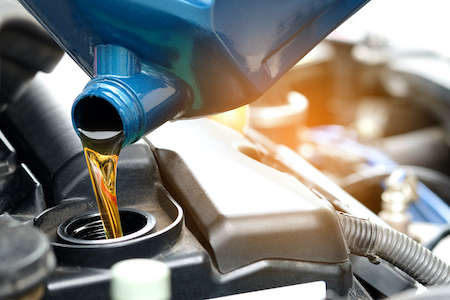Driving a car means you have to perform a few maintenance tasks along the way to keep it running well. We know we have to fill it up with gas, or it will die. We understand motor oil is necessary to keep the engine running. We need new tires, or we put the passengers inside the cabin at risk.
But when?
Everything comes with a warning sign. As that little needle gets closer to E, you’re aware if you don’t stop at a gas station, you’ll be stranded along the side of the road.
Popular guidance tells you to replace the oil in your car every 3,000 miles. But is that the best advice?
Do you need to change your motor oil every 3,000 miles, or is there some other way to evaluate when it’s needed?
What motor oil does
What does motor oil do inside your vehicle? Most of us know that motor oil keeps your car running, but it does a lot more than that.
Today’s motor oil is a complex mixture of oils and additives that accomplish a variety of things under the hood. It:
- Lubricates moving parts
- Helps reduce engine wear
- Removes dirt and contaminants from the oil
- Cools engine parts
- Enhances fuel efficiency
- Protects the engine against heat and cold
- Helps protect the emission system
 Without the proper motor oil inside your vehicle, it’ll quickly wear down various parts.
Without the proper motor oil inside your vehicle, it’ll quickly wear down various parts.
Every time you start up your car, the combustion process degrades your motor oil. It adds contaminates to the oil supply, which over time, builds up. In the beginning, motor oil can handle it without issue. But as it wears, it continues to break down, turning into sludge that can harm your engine.
That’s a lot for a few cans of motor oil to handle. That’s also why it’s essential to change it out regularly.
But is it important to change motor oil every 3,000 miles?
Now that you know why changing out motor oil is important, let’s get back to the question of how often.
It doesn’t take a lot of searching online to discover there are many different views on how often you should change out your motor oil. But who’s right?
Start by looking at the source of information.
Quick-lube places will tell you to change your oil every 3,000 miles. They even give you little stickers as a reminder.
It’s important to consider the source, however, before you take their advice. Quick-lube stores offer one service: motor oil changes. That means they have a vested interest in getting you in as much as they possibly can. They are also usually sponsored by a particular brand of motor oil. Again, it’s all about the sales.
Another resource to look at is your own vehicle’s manufacturer. If you check your owner’s manual, you’ll likely find they make their own recommendations. With today’s technology, a lot of them recommend an oil change every 5,000 to 7,500 miles.
That’s a lot different than the 3,000 miles.
But there’s another thing to consider. In most cases, it’s not about how many miles you drive, it’s also about the timeframe between oil changes. For some drivers, it may take a year or more to hit the 3,000 miles. Others may hit that mile marker in a matter of days.
Driver A works from home and only takes their car out to run errands. They drive ten miles or less at a time, with constant starting and stopping. With frequent stops, the motor oil never heats up enough to boil off the moisture condensation. That means more engine wear over time. They shouldn’t pay attention to the 3,000 rule, but should instead change it out twice a year or so.
Driver B has a long commute, driving more than 20 miles one way that consists of mostly highway driving. With this slow and steady drive time, they could easily push the upper edge of what their vehicle’s manufacturer recommends.
In both cases, as the car ages, more frequent oil changes may be in order. Remember, the key to keeping your engine running well is clean performing motor oil. It’s one of the least expensive ways to ensure your car stays running smoothly.
What type of motor oil should I use?
All motor oil is not the same. Which motor oil you use in your car should be determined by a variety of factors, including the climate you live in, your driving habits, as well as the age of your vehicle.
When you bring your vehicle into our service station for an oil change, you can discuss which type of oil you prefer to use for your engine. We’re here to give you advice every step of the way.
In general, there are four types of motor oil:
Synthetic motor oil – this is ideal for high performance vehicles. It provides higher viscosity levels and helps fight oil sludge.
Synthetic blend motor oil – this is becoming increasingly popular as it combines both conventional motor oil with synthetic. It offers extra resistance to oxidation, and more protection against lower temperatures.
Conventional motor oil – this is ideal for older models cars that have operated on this type of motor oil for years.
High mileage motor oil – This is specifically blended for vehicles that have exceeded 75,000 miles. It helps minimize leaks and reduces emissions.
When was the last time you changed your motor oil?
To work out a plan that works well with your vehicle, talk with one of our mechanics today. We can give advice on how often it should be replaced, and what type of motor oil to add to your vehicle’s system each visit.
